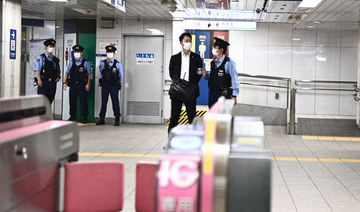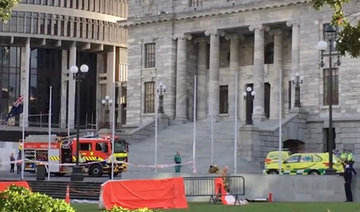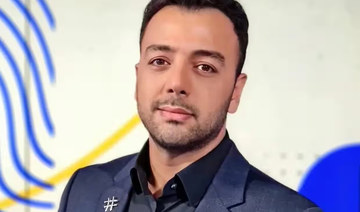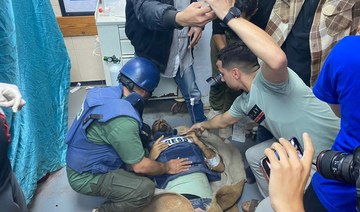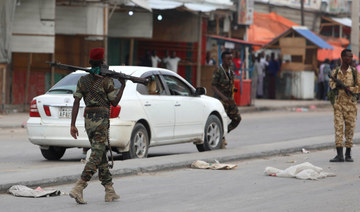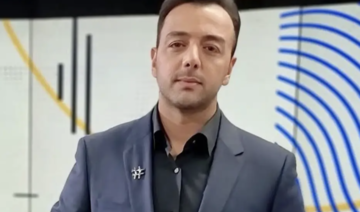WASHINGTON: She is largely unknown in the US. But the American anchorwoman for Iran’s state-run broadcaster, detained last weekend by US authorities, is a familiar face on its English-language channel.
As a newscaster for Press TV, Marzieh Hashemi has been conducting interviews and reading the news as written by government loyalists in Iran. It’s a long way from New Orleans, where she was born Melanie Franklin in 1959 to a Christian family.
In college in Louisiana, encounters with Iranian students in the wake of Iran’s 1979 Islamic Revolution saw her convert to Islam. A marriage brought her to Iran, where she learned fluent Farsi and began working for the country’s state broadcaster 25 years ago.
Her journalism and her public comments mirror her host country’s official ideology.
“When I got familiar with Islamic Revolution in Iran, and I saw it was a political and religious revolution, I was attracted to this,” Hashemi once told an interviewer in Farsi. “I saw this as a political movement to the revolution.”
Now, after her apparent arrest by the FBI, her family is questioning why the 59-year-old grandmother was imprisoned by the US Her detention comes at a time of escalating US-Iran tensions, including President Donald Trump’s maximalist approach to Iran after pulling America out of its nuclear deal.
Hashemi was detained Sunday in St. Louis, where she had filmed a Black Lives Matter documentary after visiting relatives in the New Orleans area. She was then taken to Washington by the FBI on a material witness warrant, according to her elder son, Hossein Hashemi.
The FBI said in an email that it had no comment.
Federal law allows judges to order witnesses to be arrested and detained if the government can prove their testimony has extraordinary value for a criminal case and that they would be a flight risk and unlikely to respond to a subpoena. The statute generally requires those witnesses to be promptly released once they are deposed.
Hashemi studied journalism at Louisiana State University in Baton Rouge. A yearbook photo shows her smiling with other colleagues at WPRG, now KLSU, the student-run radio station.
“When we were in school together, that was during the Iran hostage crisis. LSU had a sizeable number of Iranian students who were going to school there,” said radio newsman Jim Engster of Baton Rouge, who was also in the photograph.
“The time we were in school was less than 25 years from LSU being an all-white school. So Melanie was a trailblazer too as a black female journalist. There were a few others but not many.”
Hashemi said that’s where she learned about Iran’s revolution, which saw Shah Mohammad Reza Pahlavi replaced by an Islamic Republic led by Ayatollah Ruhollah Khomeini, a Shiite cleric who had final say on state matters as the country’s supreme leader.
“I started to ask them about the revolution, because there were many demonstrations by pro-Khomeini demonstrators and also against the revolution in that university,” she later recounted. “I wanted to know that what they are doing and find out who is the Ayatollah Khomeini, and it was very interesting for me as an activist.”
Hashemi ended up in Iran working at Iran’s state broadcaster, the Islamic Republic of Iran Broadcasting, or IRIB.
There are no private television or radio stations in Iran. Satellite dishes, while widespread, also are illegal. That leaves IRIB with a monopoly on domestic airwaves.
Since the revolution, IRIB has been in the hands of hard-liners who back Iran’s government. Their broadcasts mirror those of other state-run channels across the Mideast, with direct criticism of leaders incredibly rare.
Press TV, launched in June 2007, is IRIB’s English-language service. While airing in Iran, it focuses predominantly on international affairs through the lens of how leaders in the Islamic Republic see the world. The hashtag “FreePalestine” accompanies stories on the conflict between Israelis and Palestinians. Fierce criticism of British and American foreign policy is common.
Its broadcasts have drawn Western criticism.
In 2012, the Anti-Defamation League described the channel as “one of the world’s leading dispensers of conspiratorial anti-Semitism in English.”
The channel was pulled from the air in Britain in 2011 after a complaint by Maziar Bahari, a Canadian-Iranian journalist for Newsweek who was imprisoned by Iran after the 2009 disputed re-election of hard-line President Mahmoud Ahmadinejad became the Green Movement protests. Bahari said the channel aired an interview that had been scripted by his captors, who threatened to execute him unless he cooperated.
For her part, Hashemi both helmed newscasts critical of the West and offered her own criticisms as well.
In 2009, she said she believed Western media exaggerated popular support in Iran for Mir Hossein Mousavi, a reformist who was later put under house arrest, where he has languished for years after challenging Ahmadinejad in 2009 and leading the Green Movement protests.
“What is shown many times in the West, for example, when people saw that there was a very large demonstration supporting Mr. Mousavi, people got the feeling that the country was falling apart and that the majority of Iranians actually supported Mr. Mousavi,” Hashemi told NPR. “No, the majority of them did not, and the other side of the spectrum has not been shown as much, I believe.”
It remains unclear why Hashemi was arrested. However, it isn’t the first time she’s been questioned by US authorities, her son said.
For the past decade, “she has been harassed on a regular basis when she goes to airports,” he said. “Whenever she boards a plane, prior to it she will have interviews or interrogation, if we might call it that— things that are not very typical is what she’s had to deal with for some time.”
From New Orleans to Tehran: Life of detained Iran newscaster Marzieh Hashemi
From New Orleans to Tehran: Life of detained Iran newscaster Marzieh Hashemi

- Hashemi studied journalism at Louisiana State University in Baton Rouge
- Hashemi ended up in Iran working at Iran’s state broadcaster
Live video of man who set himself on fire outside court proves challenging for news organizations
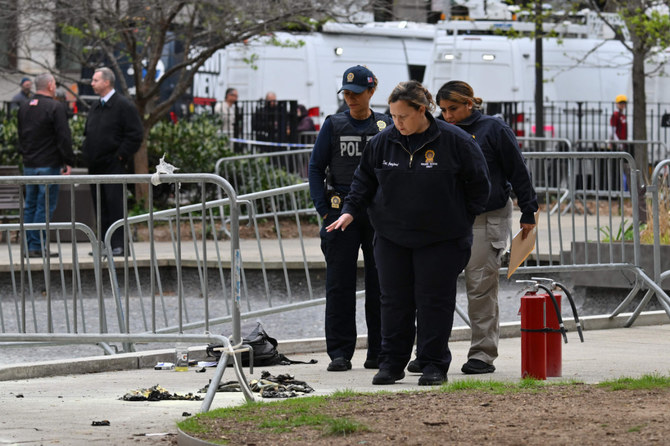
- The man, who distributed pamphlets before dousing himself in an accelerant and setting himself on fire, was in critical condition
- The incident tested how quickly the networks could react, and how they decided what would be too disturbing for their viewers to see
NEW YORK: Video cameras stationed outside the Manhattan courthouse where former President Donald Trump is on trial caught the gruesome scene Friday of a man who lit himself on fire and the aftermath as authorities tried to rescue him.
CNN, Fox News Channel and MSNBC were all on the air with reporters talking about the seating of a jury when the incident happened and other news agencies, including The Associated Press, were livestreaming from outside the courthouse. The man, who distributed pamphlets before dousing himself in an accelerant and setting himself on fire, was in critical condition.
The incident tested how quickly the networks could react, and how they decided what would be too disturbing for their viewers to see.
With narration from Laura Coates, CNN had the most extensive view of the scene. Coates, who at first incorrectly said it was a shooting situation, then narrated as the man was visible onscreen, enveloped in flames.
“You can smell burning flesh,” Coates, an anchor and CNN’s chief legal analyst, said as she stood at the scene with reporter Evan Perez.
The camera switched back and forth between Coates and what was happening in the park. Five minutes after the incident started, CNN posted the onscreen message “Warning: Graphic Content.”
Coates later said she couldn’t “overstate the emotional response of watching a human being engulfed in flames and to watch his body be lifted into a gurney.” She described it as an “emotional and unbelievably disturbing moment here.”
Fox’s cameras caught the scene briefly as reporter Eric Shawn talked, then the network switched to a courtroom sketch of Trump on trial.
“We deeply apologize for what has happened,” Shawn said.
On MSNBC, reporter Yasmin Vossoughian narrated the scene. The network showed smoke in the park, but no picture where the body was visible.
“I could see the outline of his body inside the flames,” Vossoughian said, “which was so terrifying to see. As he went to the ground his knees hit the ground first.”
The AP had a camera with an unnarrated live shot stationed outside the courthouse, shown on YouTube and APNews.com. The cameras caught an extensive view, with the man lighting himself afire and later writhing on the ground before a police officer tried to douse the flames with a jacket.
The AP later removed its live feed from its YouTube channel and replaced it with a new one because of the graphic nature of the content.
The news agency distributed carefully edited clips to its video clients — not showing the moment the man lit himself on fire, for example, said executive producer Tom Williams.
Russian war correspondent for Izvestia killed in Ukraine
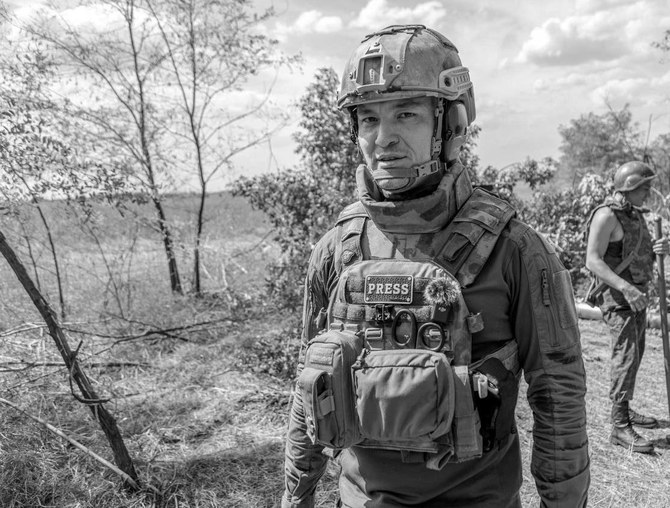
- Izvestia said Semyon Eremin, 42, died of wounds from a drone attack in Zaporizhzhia region
- Eremin had reported for the Russian daily from hottest battles in Ukraine during the 25-month-old war
Semyon Eremin, a war correspondent for the Russian daily Izvestia, was killed on Friday in a drone attack in southeastern Ukraine, the daily said.
Izvestia said Eremin, 42, died of wounds suffered when a drone made a second pass over the area where he was reporting in Zaporizhzhia region.
Izvestia said Eremin had sent reports from many of the hottest battles in Ukraine’s eastern regions during the 25-month-old war, including Mariupol, besieged by Russian troops for nearly three months in 2022.
He had also reported from Maryinka and Vuhledar, towns at the center of many months of heavy fighting.
WhatsApp being used to target Palestinians through Israel’s Lavender AI system
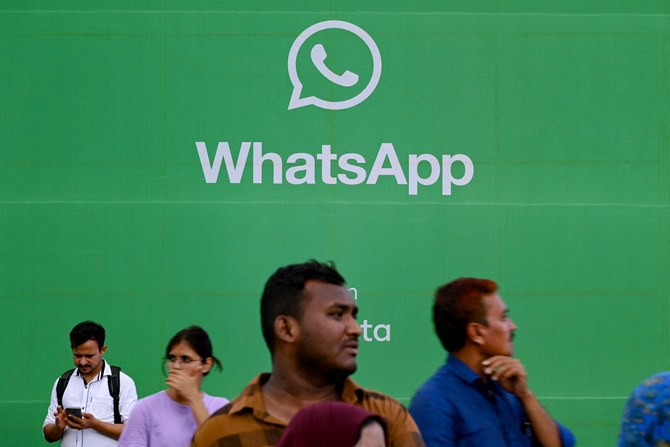
- Targets’ selection based on membership to some WhatsApp groups, new report reveals
- Accusation raises questions about app’s privacy and encryption claims
LONDON: WhatsApp is allegedly being used to target Palestinians through Israel’s contentious artificial intelligence system, Lavender, which has been linked to the deaths of Palestinian civilians in Gaza, recent reports have revealed.
Earlier this month, Israeli-Palestinian publication +972 Magazine and Hebrew-language outlet Local Call published a report by journalist Yuval Abraham, exposing the Israeli army’s use of an AI system capable of identifying targets associated with Hamas or Palestinian Islamic Jihad.
This revelation, corroborated by six Israeli intelligence officers involved in the project, has sparked international outrage, as it suggested Lavender has been used by the military to target and eliminate suspected militants, often resulting in civilian casualties.
In a recent blog post, software engineer and activist Paul Biggar highlighted Lavender’s reliance on WhatsApp.
He pointed out how membership in a WhatsApp group containing a suspected militant can influence Lavender’s identification process, highlighting the pivotal role messaging platforms play in supporting AI targeting systems like Lavender.
“A little-discussed detail in the Lavender AI article is that Israel is killing people based on being in the same WhatsApp group as a suspected militant,” Bigger wrote. “There’s a lot wrong with this.”
He explained that users often find themselves in groups with strangers or acquaintances.
A lot of difficult questions for Meta before that trust can be rebuilt, and I don't honestly believe that Meta can or will answer them pic.twitter.com/vaeLbg9hx3
— Paul Biggar (@paulbiggar) April 16, 2024
Biggar also suggested that WhatsApp’s parent company, Meta, may be complicit, whether knowingly or unknowingly, in these operations.
He accused Meta of potentially violating international humanitarian law and its own commitments to human rights, raising questions about the privacy and encryption claims of WhatsApp’s messaging service.
The revelation is just the latest of Meta’s perceived attempts to silence pro-Palestinian voices.
Since before the beginning of the conflict, the Menlo Park giant has faced accusations of double standards favoring Israel.
In February, the Guardian revealed that Meta was considering the expansion of its hate speech policy to the term “Zionist.”
More recently, Meta quietly introduced a new feature on Instagram that automatically limits users’ exposure to what it deems “political” content, a decision criticized by experts as a means of systematically censoring pro-Palestinian content.
Responding to requests for comment, a WhatsApp spokesperson said that the company could not verify the accuracy of the report but assured that “WhatsApp has no backdoors and does not provide bulk information to any government.”
Eastern European mercenaries suspected of attacking Iranian journalist Pouria Zeraati
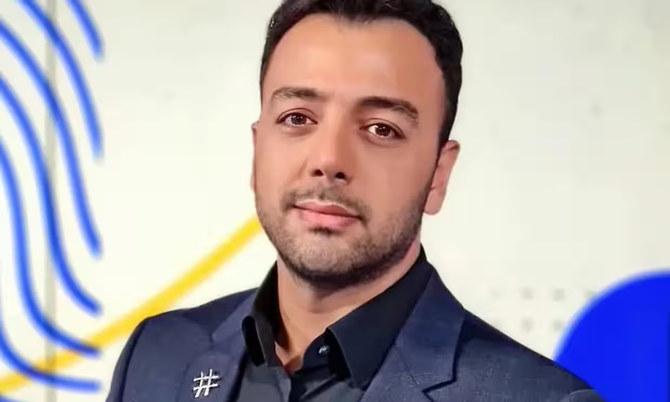
- UK security services believe criminal proxies with links to Tehran carried out London knife attack
LONDON: Police said on Friday that a group of Eastern European mercenaries is suspected to have carried out the knife attack on Iranian journalist Pouria Zeraati in late March.
Zeraati was stabbed repeatedly by three men in an attack outside his south London home.
The Iran International presenter lost a significant amount of blood and was hospitalized for several days. He has since returned to work, but is now living in a secure location.
Iran International and its staff have faced repeated threats, believed to be linked to the Iranian regime, which designated the broadcaster as a terrorist organization for its coverage of the 2022 protests.
Iran’s charge d’affaires, Seyed Mehdi Hosseini Matin, denied any government involvement in the attack on Zeraati.
Investigators revealed that the suspects fled the UK immediately after the incident, with reports suggesting they traveled to Heathrow Airport before boarding commercial flights to different destinations.
Police are pursuing leads in Albania as part of their investigation.
Counterterrorism units and Britain’s security services leading the inquiry believe that the attack is another instance of the Iranian regime employing criminal proxies to target its critics on foreign soil.
This method allows Tehran to maintain plausible deniability and avoids raising suspicions when suspects enter the country.
Zeraati was attacked on March 29 as he left his home home to travel to work. His weekly show serves as a source of impartial and uncensored news for many Iranians at home and abroad.
In an interview with BBC Radio 4’s “Today” program this week, Zeraati said that while he is physically “much better,” mental recovery from the assault “will take time.”
Court orders release of prominent Palestinian professor suspected of incitement
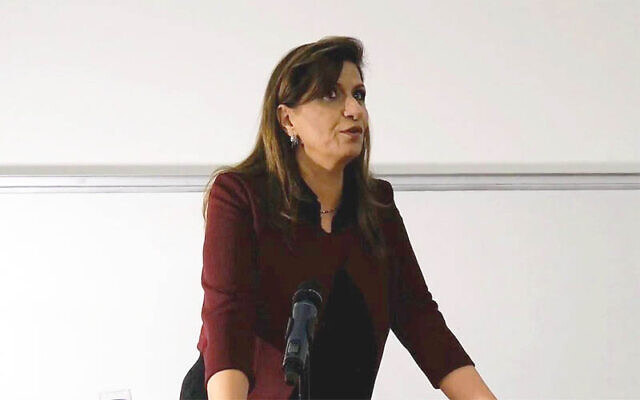
- Nadera Shalhoub-Kevorkian was under investigation after questioning Hamas atrocities, criticizing Israel
- Insufficient justification for arrest, says court
- Detention part of a broader campaign, says lawyer
LONDON: The prominent Hebrew University of Jerusalem professor, Nadera Shalhoub-Kevorkian, was released on Friday after a court order rejected police findings.
The criminologist and law professor was arrested the previous day on suspicion of incitement. She had been under investigation for remarks regarding the Oct. 7 attacks by Hamas and for saying Israelis were committing “genocidal crimes” in the Gaza Strip and should fear the consequences.
On Friday, the court dismissed a police request to extend her remand, citing insufficient justification for the arrest, according to Hebrew media reports.
Protesters gathered outside the courthouse to demonstrate against Shalhoub-Kevorkian’s arrest.
Israeli Channel 12, which first reported the news, did not specify where Shalhoub was arrested but her lawyer later confirmed she was apprehended at her home in the Armenian Quarter of Jerusalem.
“She’s not been in good health recently and was arrested in her home,” Alaa Mahajna said. “Police searched the house and seized her computer and cellphone, [Palestinian] poetry books and work-related papers.”
Mahajna described Shalhoub-Kevorkian’s arrest as part of a broader campaign against her, which has included numerous threats to her life and of violence.
The professor was suspended by her university last month after calling for the abolition of Zionism and suggesting that accounts of sexual assault during the Hamas-led attacks on Israel were fabricated.
The suspension was initially criticized by the university community as a blow to academic freedom in Israel. However, the decision was later reversed following an apology from Shalhoub-Kevorkian and an admission that sexual assaults took place.
Since hostilities began last year, numerous dissenting voices in Israel have faced arrest for expressing solidarity with victims of the bombardment in Gaza.
In October, well-known ultra-Orthodox Israeli journalist Israel Frey was forced into hiding following a violent attack on his home.
Bayan Khateeb, a student at the Technion-Israel Institute of Technology, was arrested last year for incitement after posting an Instagram story showing the preparation of a popular spicy egg dish with the caption: “We will soon be eating the victory shakshuka.”





